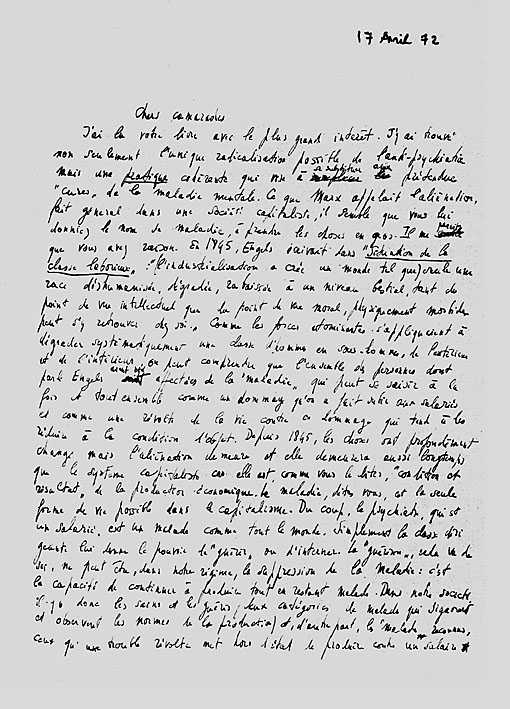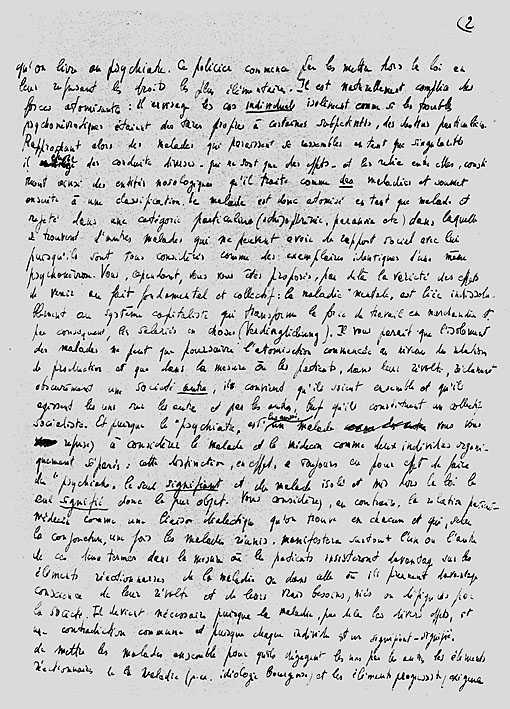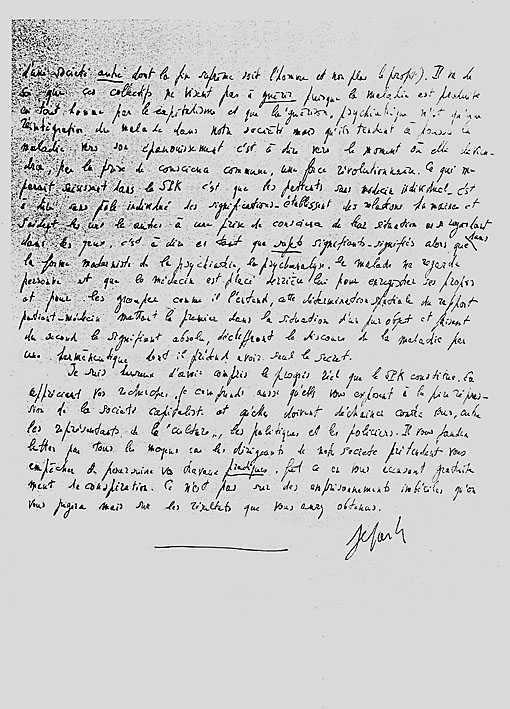
with most great interest I have read your book. I found in your book not only the sole possibility to radicalize anti-psychiatry but also a consistent practice, with the aim of abolishing (aufzuheben) the "therapeutic methods" of mental illness which are altogether only so-called ones.
On the whole it seems that you have subsumed what Marx called alienation and what is made common property in a capitalist society, under illness and its very concept (Begriff). This is well done. In 1845 Engels wrote in "About the Situation of the Working Class in England" (Zur Lage der arbeitenden Klasse in England) that by means of capitalist industrialization there has been created a world, "in which only that species of mankind is able to feel at home, which is dehumanized, degraded - both in the intellectual as in the moral sense -, sunken down and humiliated to the level of a beast, somatically ill (physisch morbid)."
As the atomizing violences systematically and permanently are crippling one class of human beings to sub-humans (Untermenschen) - this both externally and internally - we all can see and understand that the sample in totality of these human beings Engels is referring to has been struck by this illness which can be conceived as one great damage which is inflicted at once on those who are depending on wages (Lohnabhaengigen) and as rebellion of life against this damage, which had reduced them to the state of mere objects. The social relations having changed since 1845 profoundly, alienation (Entfremdung) is persisting up to now. And it will remain so, as long as the capitalist System does, for this alienation is, as you express it, "prerequisite and result" (Voraussetzung und Resultat) of the economic production. Illness is - as you say - the only way (Form) of life in capitalism. It is true that the psychiatrist who is a wage-dependent (Lohnabhaengiger), is - as everybody and we ourselves are - an ill man. But it is only to him that the ruling class offers the power to "heal" ("heilen") or to intern (zu heilen oder einzuweisen). "Curing" ("Heilung"), that goes without saying, in the ruling System can never mean abolishing (Abschaffung) illness; it ("curing", "healing") exclusively serves to restore your fitness to work (Arbeitsfaehigkeit) while you continue being ill. Therefore there exist in our society persons who are on the one hand either cured or healthy (two categories of persons being unconsciously ill, the first one is good for the doctors to fulfil, to prove, to demonstrate and to "establish" the signs of production and the second part also cannot but affirm those signs - see also signifiant and signifié or Signifikant and Signifikat by Lacan and others) and on the other hand those who are the ill persons being registered (anerkannten Kranken), those who are inabled by an unaimed revolt (ungezielte Revolte) to produce wage-work (Lohnarbeit zu leisten) and who therefore are delivered to the psychiatrist.

This policeman at first casts them out of law refusing them the most elementary rights. Of course he is the accomplice of the atomizing violences (der atomisierenden Gewalten): he picks up individual cases in an isolating manner, so as if psychosomatic disturbances in a certain person would be this person's own lack and personal misfortune. Then he makes a sample out of those patients who seem to him to look like each other, be it in only one single manner, brought up by him from a phenomenon to a specifity in diagnostics and now he continues studying their different behaviours, having correlated all the effects here named so that they become a summary consisting in itself (ensemble, entity) (Nosology = description of phenomena, done in a mechanistic way) and finally this product, created by the doctor's skill itself, is treated by him as the illnesses as such after having submitted them to a classification before. The ill person as such therefore is atomized and thrown back into a special category (schizophrenia, paranoia etc.), a category in which also other ill persons are situated who can be nevertheless in no way socially related to him for everyone of these persons has to be regarded by the psychiatrists as identical specimen (identische Exemplare) of one and the same psychoneurosis. You, in contrary to this, have established to aim at the following end: the basic cause which is a collective one looking down to the multiplicity of phenomena - : "mental disease" is indissolubly tied to the capitalist System which turns working power (labour force) to a commodity (in eine Ware verwandelt) and in consequence of this turns wage-slaves (Lohnabhaengige) into (fixed) things (reification, objectification, Verdinglichung). It is quite clear for you that isolating diseased persons is nothing but a perpetuation of the atomization and the isolation which is caused and determined by the relations of production (Produktionsverhaeltnissen) and it is also quite clear to you that in the same measure in which patients in their revolt put the question to establish another society, in a manner which is not yet clear enough, there emerges the necessity to form a community, to agitate each other, briefly, they have to create a socialist collective.
And because the "psychiatrist" is a sick man himself you refuse to take a sick one and the physician as two different persons who were by nature different individuals: for indeed and in consequence of this differentiation it has been always the "psychiatrist" himself and he alone to become the only signifier (Sinngeber, Deuter, Bedeuter und - last not least: - Bedeutender), meanwhile the patient in disease, outlawed and isolated is turned into the only signified one (Signifikat = indifferentes Ding, willkuerlich belegbar, funktionalisierbar durch und mit Bedeutungen, Zweck und Absicht der signifizierenden Person, naemlich des Arztes, bzw. Psychiaters. Naeheres bei Lacan, Seminarien), the patient being then nothing but a thing. In your view, quite on the contrary, the relation between physician and patient is a dialectic unit (dialektische Einheit) to be found (rooted) in everybody; once the patients have formed a group-connection, there is, in the inner of this dialectic relation, related to the respective circumstances respectively at times the one, at other times the other movens (Moment) the determining one and that in the measure, in which the patients either insist in the reactionary impetus (Moment) of illness, or are becoming consciously aware of their revolt and of their true interests (Beduerfnisse) which are suppressed and deformed by society. Realizing that illness, beyond the different phenomena, is a basic contradiction in everybody (allgemeiner Widerspruch) and as every individual is at the same time signifier and signified, it becomes necessary for the patients to form a collective, in order to enable themselves to regard each other thus putting into light and separating on the one hand the reactionary impulses (Momente) (e.g. bourgeois ideology) and the progressive impulses on the other hand (demanding a different = an-other society, in which the most important aim is mankind but not profit any longer).

There can be no doubt, that collectives like those never can look for any kind of "healing" because capitalism produces illness in everybody, and because "psychiatric healing" only means re-integration of sick people into our society, but that instead of this all those collectives have to struggle to the aim to bring illness to its whole evolution, that means to bring it up to that point where disease becomes a revolutionary power by means of becoming jointly aware by consciousness.
For me the flabbergasting impression concerning SPK consists in that the patients without individual doctors (sans médecin individuel) - without an individuated pole of significations - produce human relations and help one another to get aware of their situation, looking one another into their eyes, which means that they act as being subjects in the sense signifier and signified; meanwhile in all modern psychiatry, especially in the psycho-analysis the sick person regards nobody, the doctor sitting behind him, occupied by making notes of the sick person's ideas (Einfaelle) to register them, to categorize them just in that manner which the doctor takes to be the right one (pour enregistrer ses propos et pour les grouper comme il l'entend). This spatial determination of the relation between doctor and patient (Arzt-Patient-Verhaeltnis) turns the patient in the situation of being nothing but an object, turning the latter - that is the doctor - into an absolute signifier, who deciphers the language of illness by means of hermeneutics, the secret of which he alone claims to know.
I'm glad of having comprehended the true and real progress the SPK constitutes. After having appreciated your research-work I also understand quite well that this work exposes you to the most evil repressions of capitalist society, not only to the violence of the representatives of "culture", but your work also cannot but unchain (unleash, entfesseln) the violence of statesmen and policemen against you. You shall be forced to use all means of fight, because the imperialists in our society (die Herrschenden in unserer Gesellschaft) apply themselves to stop you continuing your practical work, be it merely by shabbily bringing up charges of conspiracy against you.
But nevertheless you shall not be judged by the measure of feable-minded detentions but by the measure of the results, you have produced.
